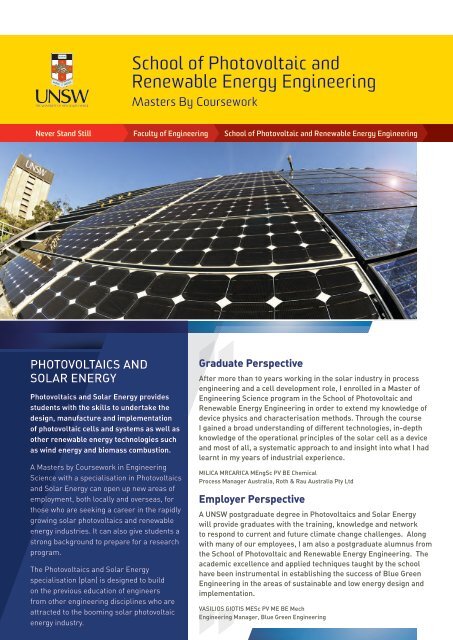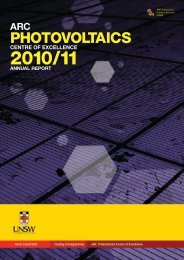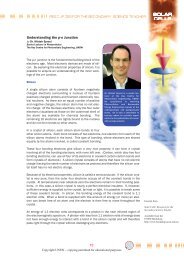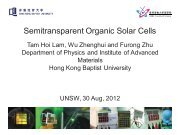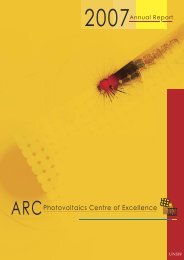PG Coursework Flyer (PDF)
PG Coursework Flyer (PDF)
PG Coursework Flyer (PDF)
You also want an ePaper? Increase the reach of your titles
YUMPU automatically turns print PDFs into web optimized ePapers that Google loves.
School of Photovoltaic and<br />
Renewable Energy Engineering<br />
Masters By <strong>Coursework</strong><br />
Never Stand Still Faculty of Engineering School of Photovoltaic and Renewable Energy Engineering<br />
PHOTOVOLTAICS AND<br />
SOLAR ENERGY<br />
Photovoltaics and Solar Energy provides<br />
students with the skills to undertake the<br />
design, manufacture and implementation<br />
of photovoltaic cells and systems as well as<br />
other renewable energy technologies such<br />
as wind energy and biomass combustion.<br />
A Masters by <strong>Coursework</strong> in Engineering<br />
Science with a specialisation in Photovoltaics<br />
and Solar Energy can open up new areas of<br />
employment, both locally and overseas, for<br />
those who are seeking a career in the rapidly<br />
growing solar photovoltaics and renewable<br />
energy industries. It can also give students a<br />
strong background to prepare for a research<br />
program.<br />
The Photovoltaics and Solar Energy<br />
specialisation (plan) is designed to build<br />
on the previous education of engineers<br />
from other engineering disciplines who are<br />
attracted to the booming solar photovoltaic<br />
energy industry.<br />
Graduate Perspective<br />
After more than 10 years working in the solar industry in process<br />
engineering and a cell development role, I enrolled in a Master of<br />
Engineering Science program in the School of Photovoltaic and<br />
Renewable Energy Engineering in order to extend my knowledge of<br />
device physics and characterisation methods. Through the course<br />
I gained a broad understanding of different technologies, in-depth<br />
knowledge of the operational principles of the solar cell as a device<br />
and most of all, a systematic approach to and insight into what I had<br />
learnt in my years of industrial experience.<br />
Milica Mrcarica MEngSc PV BE Chemical<br />
Process Manager Australia, Roth & Rau Australia Pty Ltd<br />
Employer Perspective<br />
A UNSW postgraduate degree in Photovoltaics and Solar Energy<br />
will provide graduates with the training, knowledge and network<br />
to respond to current and future climate change challenges. Along<br />
with many of our employees, I am also a postgraduate alumnus from<br />
the School of Photovoltaic and Renewable Energy Engineering. The<br />
academic excellence and applied techniques taught by the school<br />
have been instrumental in establishing the success of Blue Green<br />
Engineering in the areas of sustainable and low energy design and<br />
implementation.<br />
Vasilios Giotis MESc PV ME BE Mech<br />
Engineering Manager, Blue Green Engineering
Engineering Science<br />
2<br />
The Engineering Science program is a core offering<br />
of the Faculty of Engineering with specialisations<br />
(plans) in nine of the ten schools of the faculty.<br />
What will you study?<br />
The Photovoltaics and Solar Energy plan is a<br />
flexible specialisation with a range of courses<br />
that allow students to focus on one of a number<br />
of photovoltaics areas or on the renewable energy<br />
field in areas such as policy, wind energy and<br />
biomass energy.<br />
In the core courses, students gain in-depth<br />
knowledge of solar cell devices, systems and<br />
applications in manufacturing facilities, the<br />
operation of solar cells and advanced designs.<br />
Students have the opportunity to use the school’s<br />
award-winning stand-alone simulator of a real<br />
photovoltaics production facility as well as gain<br />
experience from site visits. They benefit from<br />
teaching software developed by the school as<br />
well as the involvement of industry leaders who<br />
participate as speakers.<br />
The EngSc (Photovoltaics and Solar Energy)<br />
requires completion of Units of Credit (UOC) in the<br />
following components: Professional Development<br />
for those with limited background, Engineering<br />
and Technical Management and Specialisation.<br />
Students enrolled in the Master or Master<br />
Extension can also undertake a project.<br />
Jobs open to graduates<br />
ßß<br />
ßß<br />
ßß<br />
ßß<br />
ßß<br />
ßß<br />
ßß<br />
ßß<br />
ßß<br />
ßß<br />
Researching new renewable energy<br />
conversion devices<br />
Planning, managing and building<br />
new renewable energy equipment<br />
production facilities<br />
Designing and installing systems in<br />
rural areas and developing countries<br />
Training technicians and end-users<br />
in the operation and maintenance of<br />
systems<br />
Carrying out economic feasibility<br />
studies<br />
Implementing energy efficiency<br />
audits and providing environmentally<br />
sustainable building consultancies<br />
Designing major project<br />
infrastructure and managing multimillion<br />
dollar projects<br />
Providing high-level technical/<br />
project input to management,<br />
financiers and markets<br />
Influencing and developing policies<br />
at community, corporate and<br />
government levels<br />
Working for major end users<br />
of renewable energy, such as<br />
communications companies
Programs available<br />
Program<br />
Code<br />
Program<br />
duration<br />
(full time<br />
equivalent) ^<br />
Total Units of<br />
Credit (UOC)<br />
Professional<br />
Development<br />
(UOC)<br />
Engineering<br />
and Technical<br />
Management<br />
(UOC)<br />
Specialisation<br />
(UOC)<br />
Project (UOC)<br />
Other<br />
Specialisation<br />
(UOC)<br />
Possible<br />
Exemptions<br />
Entry<br />
Requirements<br />
Master of<br />
Engineering<br />
Science in<br />
Photovoltaics<br />
and Solar<br />
Energy<br />
(MEngSc)<br />
8538 1.5 years 72 UOC 24 12 to 24 At least 24 0 to 12 Maximum 12<br />
Up to 4<br />
courses<br />
(24 UOC)<br />
A recognised fouryear<br />
Bachelor degree<br />
in an appropriate<br />
area of engineering<br />
with Honours 2/2 or<br />
equivalent or an average<br />
of 65% in performance<br />
over the final two years.<br />
Master of<br />
Engineering<br />
Science<br />
Extension in<br />
Photovoltaics<br />
and Solar<br />
Energy<br />
(MEngScExt)<br />
8539 2 years 96 UOC 24 12 to 24 At least 24<br />
12 to<br />
24<br />
Maximum 24<br />
Up to 4<br />
courses<br />
(24 UOC)<br />
A recognised four-year<br />
Bachelor degree in<br />
an appropriate area<br />
of engineering with<br />
Honours 1 or equivalent<br />
or an average of 75% in<br />
performance over the<br />
final two years.<br />
Graduate<br />
Diploma of<br />
Engineering<br />
Science in<br />
Photovoltaics<br />
and Solar<br />
Energy<br />
(GradDipEngSc)<br />
5338 1.5 years 60 UOC 24 6 to 18 At least 18 0 Maximum 12<br />
Up to 4<br />
courses<br />
(24 UOC)<br />
Same as MEngSc.<br />
Graduate<br />
Certificate of<br />
Engineering<br />
Science in<br />
Photovoltaics<br />
and Solar<br />
Energy<br />
(GradCertEngSc)<br />
7338 1 year 48 UOC 24 6 to 12 At least 12 0 Maximum 6<br />
Up to 4<br />
courses<br />
(24 UOC)<br />
A recognised threeyear<br />
Bachelor degree<br />
in an appropriate<br />
area of engineering<br />
with Honours 2/2 or<br />
equivalent or an average<br />
of 65% in performance<br />
over the final two years.<br />
3<br />
^ All programs are available on a full load (24 UOC per semester) or partial load basis. At a minimum, students must enrol in 18 UOC over three<br />
consecutive semesters.<br />
Articulation: Students can apply to articulate from the GradDipEngSc (5338) to the MEngSc (8538); from the MEngSc (8538) to the MEngScExt (8539);<br />
and from the GradCertEngSc (7338) to the GradDipEngSc (5338) provided they have a credit average of at least 65 WAM. Full credit will be granted.<br />
Courses available<br />
Engineering Management Courses<br />
• GSOE9017 Managing Energy Efficiency<br />
• GSOE9210 Decision Structures in Engineering<br />
• GSOE9340 Life Cycle Engineering<br />
• GSOE9712 Engineering Statistics and Experimental Design<br />
• GSOE9840 Maintenance and Reliability Engineering<br />
• CVEN9888 Environmental Management<br />
• CVEN9892 Sustainability Assessment<br />
• GSOE9810 Quality in Engineering or CVEN9703 Quality and<br />
Quality Systems<br />
• GSOE9820 Project Management or CVEN9731 Project<br />
Management Framework<br />
• GSOE9830 Economic Decision Analysis in Engineering<br />
or CVEN9701 Engineering Economics and<br />
Financial Management<br />
Specialisation Courses<br />
In addition to the courses listed below, students may choose<br />
up to 12 UOC of courses from another specialisation list<br />
within the Master of Engineering Science**.<br />
• MANF9420 Managing Manufacturing Operations<br />
• SOLA9001 Photovoltaics*<br />
• SOLA9002 Solar Cells and Systems*<br />
• SOLA9003 High Efficiency Silicon Solar Cells**<br />
• SOLA9006 Solar Cell Technology and Manufacturing***<br />
* Compulsory for all programs (Graduate Certificate, Graduate Diploma<br />
and Master programs)<br />
** Compulsory for Master program<br />
*** Compulsory for Graduate Diploma and Master programs<br />
Please note that the list of courses is subject to change.<br />
For further information on approved courses and academic<br />
rules for each program, please visit the online handbook<br />
www.handbook.unsw.edu.au
Why UNSW?<br />
The Faculty of Engineering at UNSW<br />
is the largest faculty of engineering in<br />
Australia and is consistently ranked<br />
one of the nation’s best. It offers the<br />
widest choice of disciplines and a<br />
research-led curriculum incorporating<br />
the latest developments in each field.<br />
With extensive links to key industrial,<br />
commercial and professional<br />
organisations, the Faculty is keenly<br />
attuned to the needs of industry and<br />
employers.<br />
Who teaches the courses?<br />
Application Process<br />
International students<br />
4<br />
Our academic staff are national<br />
leaders with international reputations<br />
in their areas of specialisation and<br />
incorporate the latest technical and<br />
scientific knowledge in their courses.<br />
Associate Professor Alistair Sproul<br />
Associate Professor Alistair Sproul<br />
teaches energy efficiency, applied<br />
photovoltaics and low energy<br />
buildings and photovoltaics. He<br />
undertakes research in the latter<br />
as well as in energy efficient water<br />
pumping systems.<br />
Geoff Stapleton<br />
Mr Stapleton is Managing Director<br />
and co-founder of Global Sustainable<br />
Energy Solutions (GSES), a renewable<br />
energy training and consultancy based<br />
in Australia and providing technical<br />
training to electricians to design and<br />
install Grid Connect PV systems. He has<br />
directly been involved with projects in:<br />
Sri Lanka, Ghana, Papua New Guinea,<br />
Malaysia, China, India, Philippines,<br />
Solomon Islands, Vanuatu, Fiji, Ethiopia<br />
and Uganda. Mr Stapleton coordinates<br />
and lectures in the Stand-Alone and<br />
System Design and Installation course.<br />
Applications should be made<br />
directly to the University using<br />
the UNSW Apply Online service at<br />
www.apply.unsw.edu.au<br />
Links to information on the<br />
application process, information<br />
for international students<br />
including English language<br />
requirements, alternative<br />
paper based application form to<br />
download, and the application<br />
tracking service allowing students<br />
to check the progress of their<br />
application can also be found on<br />
www.apply.unsw.edu.au<br />
Closing Dates<br />
Applications must be lodged by<br />
the end of October for students<br />
wishing to commence their<br />
degree in Semester 1 (March),<br />
and by the end of April for<br />
students wishing to commence<br />
their degree in Semester 2 (July).<br />
Please note that not all programs<br />
have a Semester 2 start date.<br />
Late applications may be<br />
accepted after the closing dates<br />
subject to the availability of<br />
places.<br />
The information in this publication is correct as at September 2011.<br />
The University reserves the right to alter any program or admission requirement herein without any prior notice.<br />
Visit www.international.unsw.edu.au<br />
Note that international students wishing<br />
to study in Australia must have a valid<br />
Australian Student Visa, and that<br />
application and processing of this visa<br />
may take some time. Please refer to<br />
www.immi.gov.au<br />
Cost of Study<br />
Visit https://my.unsw.edu.au/student/<br />
fees/FeesMainPage.html for full details.<br />
Student Life<br />
Information on the UNSW Kensington<br />
campus, scholarships, accommodation,<br />
support to students and facilities is<br />
available at www.studentlife.unsw.edu.au<br />
Mode of Delivery<br />
All Photovoltaics and Solar Energy<br />
Postgraduate <strong>Coursework</strong> programs<br />
consist of face-to-face teaching by<br />
lectures and tutorials and in some cases<br />
labs. All course materials are online and<br />
lecture notes and audio recordings can<br />
be downloaded.<br />
Contact<br />
Email pv.course@unsw.edu.au<br />
Phone +61 2 9385 6848<br />
www.pv.unsw.edu.au<br />
Cricos provider Code 00098G


